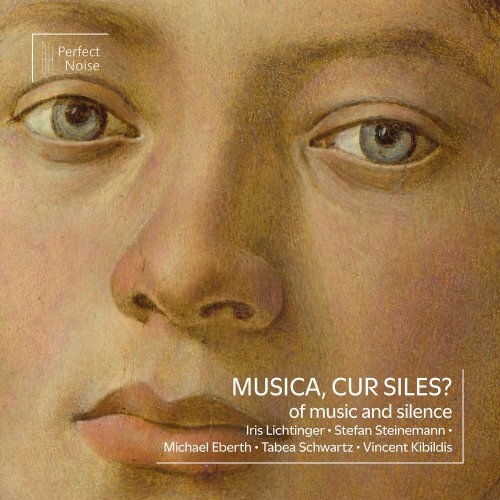
Iris Lichtinger, Michael Eberth, Stefan Steinemann - Musica, Cur Siles? (2024)
BAND/ARTIST: Iris Lichtinger, Michael Eberth, Stefan Steinemann
- Title: Musica, Cur Siles?
- Year Of Release: 2024
- Label: Perfect Noise
- Genre: Classical
- Quality: flac lossless (tracks)
- Total Time: 01:00:07
- Total Size: 299 mb
- WebSite: Album Preview
Tracklist
01. Quis dabit oculis
02. Redeuntes in Mi
03. Fortuna Desperata
04. Ach Gott straf mich nit
05. Hör an mein Klag
06. Praeambulum in Far
07. Was wird es doch
08. Tandernaken Duett
09. Ade Mit Leid
10. Dueil angoisseux
11. Tart Ara
12. Ach Elslein
13. Andernach uf dem Rhin
14. La serviteur
15. Franc cuer gentil
16. Herzliebstes Bild
17. Ma doulce amour
18. O Venus Bant
19. In Silentio Et Spe
The premiere recording of this special collection of very early chamber music.
Musica, cur siles?" (Music, why are you silent?) This question is heard in the first part of the motet Quid dabit oculis and at first the situation seems paradoxical, as the words are sung and played. However, the realisation of what has been sung follows immediately, as the question is immediately followed by a pause in all four voices - the first general pause since the beginning of the piece. What is the reason for this silence? The motet, which waswritten by the Italian composer Costanzo Festa (around 1485/1490-1545), is a composi-tion of mourning for Anne de Bretagne, who died as Queen of France in January 1514. The mourning is expressed in its text by the mentioning of the mourning robe as well as the weeping and lamentation, but the emotional low point is the cessation of the music emp-hasised by the question. In addition to the silencing of the voices, this certainly also alludes to the music that functioned as an important means of representation in the Middle Age and the early modern period: the sound of trumpets and timpani, which loudly proclaimed the presence of the ruler. Conversely, the silence of the funeral procession symbolises the absence of the ruler, which can also be perceived acoustically.
01. Quis dabit oculis
02. Redeuntes in Mi
03. Fortuna Desperata
04. Ach Gott straf mich nit
05. Hör an mein Klag
06. Praeambulum in Far
07. Was wird es doch
08. Tandernaken Duett
09. Ade Mit Leid
10. Dueil angoisseux
11. Tart Ara
12. Ach Elslein
13. Andernach uf dem Rhin
14. La serviteur
15. Franc cuer gentil
16. Herzliebstes Bild
17. Ma doulce amour
18. O Venus Bant
19. In Silentio Et Spe
The premiere recording of this special collection of very early chamber music.
Musica, cur siles?" (Music, why are you silent?) This question is heard in the first part of the motet Quid dabit oculis and at first the situation seems paradoxical, as the words are sung and played. However, the realisation of what has been sung follows immediately, as the question is immediately followed by a pause in all four voices - the first general pause since the beginning of the piece. What is the reason for this silence? The motet, which waswritten by the Italian composer Costanzo Festa (around 1485/1490-1545), is a composi-tion of mourning for Anne de Bretagne, who died as Queen of France in January 1514. The mourning is expressed in its text by the mentioning of the mourning robe as well as the weeping and lamentation, but the emotional low point is the cessation of the music emp-hasised by the question. In addition to the silencing of the voices, this certainly also alludes to the music that functioned as an important means of representation in the Middle Age and the early modern period: the sound of trumpets and timpani, which loudly proclaimed the presence of the ruler. Conversely, the silence of the funeral procession symbolises the absence of the ruler, which can also be perceived acoustically.
Year 2024 | Classical | FLAC / APE
As a ISRA.CLOUD's PREMIUM member you will have the following benefits:
- Unlimited high speed downloads
- Download directly without waiting time
- Unlimited parallel downloads
- Support for download accelerators
- No advertising
- Resume broken downloads


